Iran has carried out the execution of two members of a banned opposition group, known as the Mujahedeen-e-Khalq (MEK), sparking widespread international condemnation. The executions were reportedly carried out by hanging, and the victims were identified as Mohammad Ali Hajaghaei and Vahid Afkari. The MEK, also known as the People’s Mujahedin of Iran, is a left-wing opposition group that has been banned in Iran since the 1980s. The group has been accused of carrying out terrorist attacks against Iranian government targets, and its members have been subject to persecution and execution. The executions have been condemned by human rights organizations, including Amnesty International and Human Rights Watch, which have criticized Iran’s use of the death penalty and its treatment of opposition groups. The United States, the European Union, and other governments have also expressed outrage over the executions, calling on Iran to respect human rights and end its use of capital punishment. The MEK has been a thorn in the side of the Iranian government for decades, and its members have been subject to intense persecution. The group was founded in the 1960s as a leftist opposition movement, but it was banned after the 1979 Islamic Revolution. Since then, its members have been subject to arrest, torture, and execution. The Iranian government has accused the MEK of carrying out terrorist attacks, including bombings and assassinations, and has designated it as a terrorist organization. However, human rights groups have questioned the fairness of the trials of MEK members, and have accused the Iranian government of using the death penalty as a tool of political repression. The executions have also sparked concerns about the safety of other MEK members, who are currently being held in Iranian prisons. The Iranian government has been criticized for its human rights record, including its use of the death penalty, torture, and arbitrary detention. The country has one of the highest execution rates in the world, and its government has been accused of using the death penalty to silence opposition and maintain control. The international community has called on Iran to respect human rights and end its use of capital punishment, but the government has shown little sign of responding to these calls. The executions of the two MEK members are the latest in a long line of human rights abuses carried out by the Iranian government, and have sparked widespread outrage and condemnation. The incident has also highlighted the need for greater international pressure on Iran to respect human rights and end its use of the death penalty. The United Nations has called on Iran to impose a moratorium on the death penalty, and to ensure that all trials are fair and transparent. However, the Iranian government has shown little sign of responding to these calls, and the use of the death penalty remains a major concern. The executions have also sparked concerns about the impact on Iran’s relations with the international community, and the potential for further sanctions and isolation. The incident has highlighted the need for greater international cooperation to pressure Iran to respect human rights and end its use of the death penalty. The Iranian government’s use of the death penalty is a major concern, and the international community must continue to pressure the government to respect human rights and end this practice. The executions of the two MEK members are a tragic reminder of the need for greater international action to protect human rights and prevent such abuses in the future.
